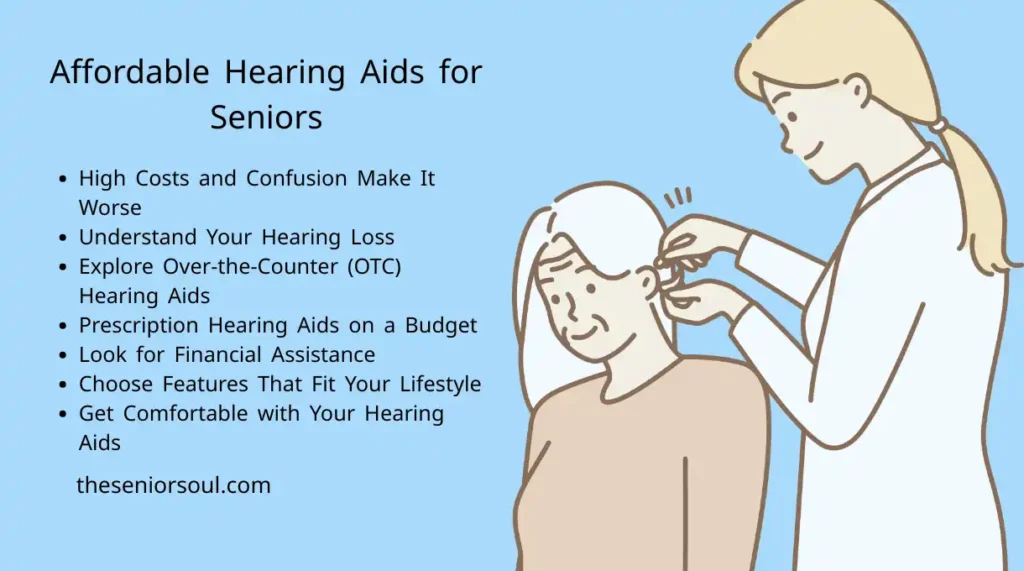Affordable Hearing Aids for Seniors: Solutions That Fit Your Budget and Needs

Hearing loss affects almost one in three persons over 65, making it a prevalent problem among the elderly. It can make social interactions, conversations, and even everyday chores feel unpleasant. Because they are expensive or unclear of their options, many seniors steer clear of hearing aids.
“The good news?” There are senior-friendly, reasonably priced hearing aids that can enhance your quality of life without breaking the budget. The difficulties of hearing loss, why it’s more serious than you might imagine, and doable ways to discover effective, affordable hearing aids are all covered in this article.
Table of Contents
Hearing Loss and Its Impact on Seniors
The onset of hearing loss is frequently gradual for seniors. You may miss calls, have trouble following conversations in busy environments, or turn up the TV excessively loudly. The National Institute on Deafness and Other Communication Disorders (NIDCD) estimates that barely one in six American adults wear hearing aids, despite the fact that around 28.8 million could benefit from them. And why? Expense is a big obstacle. For those with fixed methods traditional prescription hearing devices can be too costly, ranging between $4,000 to $7,000 each pair.
Hearing loss is more than just losing the ability to speak. Safety, relationships, and mental health are all damaged. Untreated hearing loss increases the likelihood of social isolation, sadness, and even falls, according to studies.
For example, a 2018 study published in the Journal of the American Geriatrics Society indicated that cognitive decline was 50% more likely to take place in seniors who had hearing loss. Life may become more difficult than necessary if the issue is ignored.
Why High Costs and Confusion Make It Worse
It can be really painful to pay for hearing aids. Since many seniors rely on Social Security or have little money saved, it is not practical to invest thousands for a device. Although some Medicare Advantage plans provide partial coverage, it is frequently insufficient, and Medicare does not cover hearing aids. Prescription, over-the-counter (OTC), rechargeable, and Bluetooth-enabled alternatives are just a few of the bewildering options.
The stigma is another factor. Seniors who don’t want to cope with complex gadgets or appear “old” steer clear of hearing aids. Some people experiment with inexpensive, subpar amplifiers online, only to be let down by their discomfort or poor sound quality. In addition to being time-consuming and expensive, the process of getting fitted for prescription aids can be difficult and involve several trips to the audiologist.
There’s more to the discontent. Many elderly people aren’t even aware of how much hearing loss impacts them. “I’m fine,” you could think, “I just ask people to repeat themselves.” However, trying to hear all the time might cause weariness, shame, and social avoidance. This cycle can damage relationships with friends and family and make life less enjoyable.
Finding Affordable Hearing Aids That Work
The positive aspect is that low-cost senior hearing devices are now easier to find than before. New choices are now available due to recent changes, such as the FDA’s 2022 approval of over-the-counter hearing aids. Adults with mild to moderate hearing loss can use these devices, which are far less expensive than prescription models. Let’s use doable stages and real-world examples to unravel the process of selecting the best hearing aid without going over budget.
Step 1. Understand Your Hearing Loss
Finding out what kind of hearing loss you have is the first step. It is vital to have a hearing exam. Audiologist visits, free tests at stores like Costco, and internet tests with good headphones are all options. Presbycusis, also known as high-frequency hearing loss, is the most prevalent kind among the elderly, according to the NIDCD. Your ability to hear high-pitched noises, such as doorbells or voices, is damaged.
As a case study, Mary, a 72-year-old retiree, observed that she was unable to correctly hear her grandchildren’s voices. The results of a free hearing test she had at a nearby clinic suggested that she had minor hearing loss. She was able to chose an over-the-counter (OTC) affordable hearing aid over a costly prescription one since she was aware of her unique needs.
Step 2. Explore Over-the-Counter (OTC) affordable Hearing Aids
Over-the-counter (OTC) hearing aids are revolutionary for seniors on a tight budget. Prescription-free, these gadgets have been on the market since 2022 and range in price from $500 to $1,695 per pair. Good choices are provided by companies like Sennheiser All-Day Clear and Jabra Enhance. For example, the Jabra Enhance Select 300, which costs approximately $1,695, offers settings via an easy-to-use app and crystal-clear sound. For elderly people who are at ease using smartphones in a basic way, it’s a good option.
Not to be overlooked are Apple’s AirPods Pro 2. These earphones became a dual-purpose gadget for music and hearing help in 2024 when Apple included FDA-approved affordable hearing aid functions. You can switch to the hearing aid mode on your iPhone for free if you already have AirPods Pro 2.

Step 3. Consider Prescription for affordable Hearing Aids
If you have substantial or severe hearing loss, over-the-counter aids may not be sufficient. Prescription devices, such as the Signia Motion X or Phonak Naída Lumity, are more suitable for complicated demands yet are still reasonably priced. For instance, premium prescription aids are available at Costco for as little as $1,499 per pair. To save you money, membership-based stores like Sam’s Club and Costco frequently provide free follow-up care and hearing tests.
Vets can also use VA funds to obtain free or inexpensive hearing aids. According to a U.S. Department of Veterans Affairs report from 2023, more than 1.2 million veterans were given free hearing aids. Check your eligibility with the VA or through initiatives such as the Retiree-At-Cost Hearing Aid program.
Step 4: Look for Financial Assistance
Several programs can help offset costs. Medicare Advantage plans sometimes cover part or all of hearing aid expenses, though coverage varies by plan. Medicaid may also help, depending on your income and state. Subscription services like Yes Hearing or Audicus offer payment plans, making premium models more manageable. For example, Audicus provides hearing aids starting at $699 per year with ongoing support.
Nonprofits like the Hearing Loss Association of America offer resources and grants for low-income seniors. Local Lions Clubs sometimes provide free or discounted hearing aids as part of their community outreach. Researching these options can make a big difference.
Step 5. Choose Features That Fit Your Lifestyle
Fancy features are not necessary for every hearing device. Put your needs first: comfort, usability, and great sound. For elderly people with cognitive problems, rechargeable hearing aids, such as the Phonak Naída L-PR, are ideal because they do not need changing little batteries. You may connect to phones or TVs via Bluetooth streaming, which is useful if you enjoy movies or music. Models like the Signia Motion X have this feature.
As an example, John, an 80-year-old who likes to have meals with others, selected the Jabra Enhance Select 300 because of its ability to reduce noise and its “Smart Start” feature, which helps fitting. Conversations are made easier by the app’s four environmental programs, which allow him to change settings for noisy eateries.
Step 6. Avoid Common Pitfalls
Do not purchase inexpensive amplifiers on the internet. These gadgets, which are often less than $100, increase all sounds equally, which could increase hearing problems. Use only OTC or reliable prescription brands that have received FDA approval. If mobility is an issue, stay away from versions that have removable batteries as they can be challenging to use.
Prior to buying things check reviews from reliable websites such as HearingTracker or WIRED. For example, Soundly highlighted Sennheiser’s lightweight design, while WIRED commended the Jabra Enhance Select 300 for its comfort and sound quality. User reviews can direct you to trustworthy choices.
Step 7. Get Comfortable with Your Hearing Aids
Get accustomed to hearing aids takes time. Put them on every day to aid in your brain’s adaptation to new sounds. Regular usage increases voice clarity and reduces listening fatigue, according to a 2023 study published in The Hearing Journal. Set goals for calm environments, such as your house, before venturing into noisy locations, such as restaurants.
Adjustments can be made easier with apps. As an example, you can control the volume for each ear and get virtual support with the Lexie app. Find a device with easy-to-use controls, such as the Sennheiser All-Day Clear, or ask a family member for assistance if you’re not tech-savvy.
Why Affordable Hearing Aids Matter
Seniors who can afford hearing aids are regaining their lives, not just saving money. With better hearing helps one to take part in activities, maintain relationships with loved ones, and feel comfortable in social settings. 68-year-old Susan, for example, avoided family get-togethers because she was unable to follow conversations. Owing to the Sennheiser All-Day Clear’s easy user interface and crystal-clear sound, she now enjoys game nights with her kids after purchasing it for $999.
This is supported by data: a 2021 study published in The Lancet revealed that those who use hearing aids report a 20% increase in their quality of life over those who do not. The correct gadget can make a big impact, whether you go with over-the-counter solutions like AirPods Pro 2 or prescription aids from Costco.
Tips for Long-Term Success
- See a Doctor Often, hearing might alter over time. Get your aids tested once a year to make sure they are meeting your needs.
- To prolong the life of your devices, clean your hearing aids every day and keep them in a dry case.
- Consult a Brand, a lot of brands provide free online advice. Utilize them to solve problems.
- Display perseverance, get used to wearing hearing aids can take weeks. Benefits will arise if you strive.
Conclusion
It’s not necessary for hearing loss to limit you. Cost-effective prescription choices at Costco and over-the-counter (OTC) devices like the Jabra Enhance make it easy for elders to hear effectively without breaking the bank. Begin with a hearing evaluation, look into financial aid, then select a gadget that suits your needs. You can once again discover the joys of life’s small moments, music, and conversations with the correct hearing aid. Don’t be scared by the cost or uncertainty; start now.
Sources
- National Institute on Deafness and Other Communication Disorders (NIDCD), 2023.
- Journal of the American Geriatrics Society, 2018.
- The Hearing Journal, 2023.
- The Lancet, 2021.
- U.S. Department of Veterans Affairs, 2023.
- WIRED, HearingTracker, Soundly, 2025.
RELATED POSTS
Is Joining Walking Groups for Seniors the Key to Overcoming Mood and Health
Why Do Older People Crave Attention? Hidden Emotional Needs
Senior-Friendly Apps to Transform Healthcare for Older Adults in the Digital Age
Frequently Asked Questions About Affordable Hearing Aids for Seniors
What are affordable hearing aids for seniors?
Seniors who have mild to moderate hearing loss can benefit from affordable hearing aids, such as over-the-counter (OTC) models from Sennheiser or Jabra, which range in price from $500 to $1,695. Seniors with fixed incomes can utilize them because of their clear sound and easy-to-use features.
Are OTC hearing aids effective for seniors?
OTC devices are effective for elderly people with mild to severe hearing loss. Brands such as Jabra Enhance offer app-based tweaks and crystal-clear sound. They provide an affordable option and are FDA-approved. They also cost less than prescription aids.
How much do affordable hearing aids cost?
The price range for reasonably priced senior hearing aids is $500 to $1,695 per pair. Prescription aids start at $1,499 at Costco, but over-the-counter alternatives like the AirPods Pro 2 ($250) or Jabra Enhance ($1,695) are less expensive.
Include a picture
Does Medicare cover affordable hearing aids for seniors?
Hearing aids are not covered by Medicare, however some Medicare Advantage plans do. Veterans can receive free assistance through VA benefits, while Medicaid may be able to assist low-income elders. Costs are also decreased by nonprofits and payment plans.
What features should seniors look for in hearing aids?
Seniors should place a high value on comfort, use, and excellent sound. Rechargeable batteries help with dexterity problems, while Bluetooth devices like Signia Motion X make using phones and TVs more convenient. Adjustments are made easier via apps.
Include a picture
Can seniors buy affordable hearing aids online?
Yes, OTC hearing aids from companies like Audicus and Lexie are available for seniors to purchase online. Convenient online shopping is made possible by apps that assist with setup. A hearing test is advised before making an internet purchase, which is what 13% of consumers do.
Are cheap hearing aids worth it?
Generally speaking, inexpensive amplifiers under $100 enhance all sounds badly. Seniors with modest hearing loss can benefit from improved sound quality and dependability with FDA-approved over-the-counter (OTC) hearing aids, such as the Sennheiser All-Day Clear ($999). Stay away from unapproved devices.
Include a picture
How do seniors adjust to wearing affordable hearing aids?
Wearing hearing aids should be a regular habit for seniors, beginning in quiet environments. Apps such as Lexie’s let you adjust the volume. Studies show that regular use reduces fatigue and increases speech clarity, although it takes weeks to get used to.
Where can seniors get free hearing tests?
Sam’s Club, Costco, and neighborhood clinics provide free hearing tests. Headphones are available for online testing. Finding the appropriate hearing aid for your unique loss is ensured by a professional test, particularly for seniors.
Include a Picture
What are the best affordable hearing aid brands?
Affordable OTC hearing aids are available from Sennheiser, Lexie, and Jabra Enhance ($500–1,695). Prescription medication bargains at Costco start at $1,499 just. For seniors, these brands strike a balance between price, sound quality, and use.
#HearingAids #AffordableHearingAids #SeniorHealthcare #OTCHearingAids #HearingLoss #SeniorLiving #HearingAidTechnology #BudgetHearingAids






